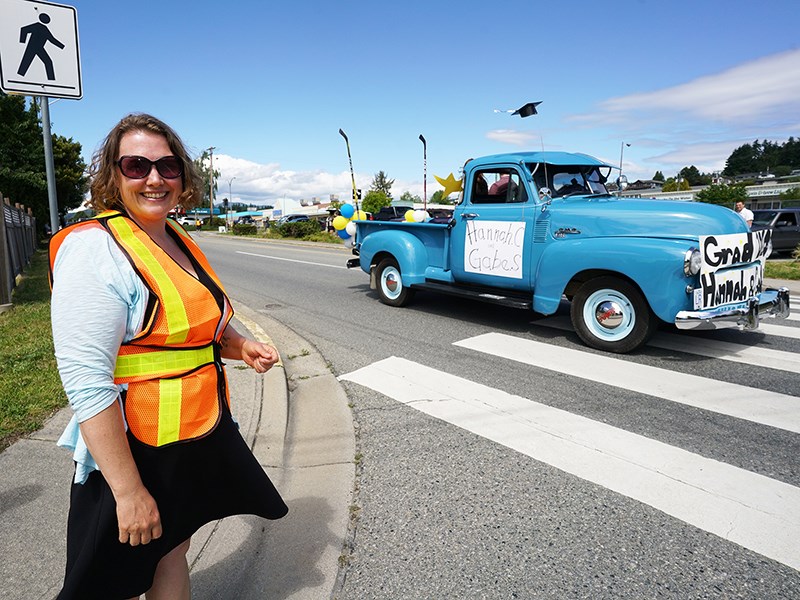Business in the House of Commons is very different in the COVID-19 era. North Island-Powell River MP Rachel Blaney has been working through her parliamentary commitments to ensure the reshaped government is being responsive to Canadians.
Blaney, in an interview on July 8, said she had just sat through a hybrid sitting of the House of Commons, which was “one for the record books.”
“We’ll see what happens next but it was interesting,” said Blaney. “There were some parliamentarians in parliament and the rest of them were across the country. When we are sitting in front of our screen, we are seeing our colleagues from all over in their offices and their homes. We are participating in our democracy in a completely different way.”
Blaney said as the parliamentarian who represents the NDP on the procedural and house affairs committee, what is being done by the committee is looking at what the House of Commons can look like in the fall, and how to address the issue of being able to do the full spectrum of work that is usually done, understanding that everybody cannot be in the house simultaneously. She said a report will come out and will be made public.
Blaney said there have been a lot of discussions at the committee level about security, such as with online platforms, and what kinds of methods should be looked at in terms of voting.
“We all know that is very important,” said Blaney, about voting. “If there is any voting happening now, it’s just the members in the house, percentage wise, representing each party. It’s definitely been an experience doing the work that you’ve done for your career but doing it in a very different way.”
Running the federal government in a hybrid system has many complexities. There are 338 parliamentarians, so accommodating the sheer number of people in the House of Commons and online is an issue. Blaney said one intricacy is that as parliament does its work, everything has to be simultaneously interpreted in French and English.
She said one of the things being looked at in the report is around the reality that in the last parliament, there was also some indigenous language spoken with an interpreter present, so there is a process that has to happen to allow that in the revised House of Commons.
“Now that we are in a different format of parliament, we are trying to find a way to follow the rules we’ve set for ourselves for that kind of flexibility,” said Blaney.
She said the committee has looked at other parliaments across the planet, seeing how other governments are coping with administration of democracy during the pandemic.
“I’m not sure what the final recommendations will be but I do believe there has to be a way to allow people who can only participate virtually to have a voice,” said Blaney. “It’s really important to honour those voices and make sure they have the capacity to represent their regions.”
In more remote areas of the country, where internet service is not as robust as it is in other areas, there may also be some issues with connectivity, said Blaney. She said the committee has worked closely with the House of Commons to make sure those issues are taken into consideration.
“If we’re in a position of taking a vote, how do we make sure those folks don’t miss out because of some sort of technical challenge that has happened?” said Blaney. “The committee has been looking long and hard into those issues, wanting to make sure we really honour parliament and the history of parliament, but recognizing that sometimes we have to adapt to these new circumstances.”
She said she is ultimately looking forward to going back to Ottawa and participating in parliament and seeing all of her colleagues there, because she thinks that part of the work is very important. Blaney acknowledges that a return to the old method of governance is an unknown. COVID-19 is the reality and everyone has seen how things have fundamentally changed, she added.
The work of the all-party COVID-19 committee in parliament is done, said Blaney, so parliamentarians will continue to meet through the hybrid system.
She said the hybrid parliament will be meeting at least four times this summer and it is something the NDP fought for during negotiations.
“We wanted to make sure, during changing times, the government was held to account twice a month over the summer months because things are changing quickly and we need the ability to ask questions and to hold the government to account during these very challenging times,” said Blaney.
She said the parliamentary structure is fundamental to Canada, and if it is going to be changed or altered, she said she hopes the government is thoughtful in how it is going to change it, and that parliament is not taken for granted.
“We need to focus on how we are going to do the work,” said Blaney, “in the middle of a pandemic.”



